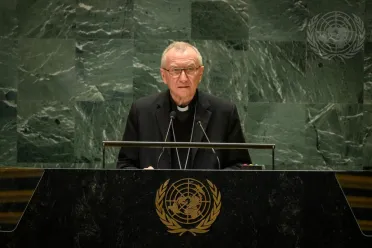Statement
Statement summary
PIETRO PAROLIN, Secretary of State of the Holy See, noting the targeting of places of worship, educational institutions, medical facilities and other civil infrastructure as a prevalent phenomenon, called for the strict observance of international humanitarian law in all armed conflicts. He pointed to the destabilizing role often played by violent non-State actors in many of the crises around the globe and stressed that: “It is imperative that these groups seek constructive engagement with States, renounce violence and acts of terrorism and enter into legality.” “Peace is only possible if it is wanted,” he underscored, urging the international community to pursue peace as a collective responsibility and “move beyond rhetoric and the tendency to ascribe blame”. Given the tendency in times of conflict to seek military victory, diplomacy must pursue every avenue for negotiation to establish enduring peace.
Foremost among the root causes of war is hunger, he said, yet the tendency to maintain growth in military expenditure prevails. “Pope Francis appeals to rich countries to acknowledge the gravity of so many of their past decisions and determine to forgive the debts of countries that will never be able to repay them,” he underscored. Reiterating Pope Francis’ call for “respect for life”, he voiced hope for an effort by the international community to prohibit universally “the practice of so-called surrogate motherhood”. Also, the dignity of migrants must be upheld, and the trafficking of human beings must be stopped, and traffickers brought to justice. Further, he voiced concern about the poorest countries who contribute the least to climate change, but “carry the greatest burden of its effects”. On the rise of new technologies, he stressed the need to “ensure and safeguard a space for proper human control over choices made by artificial intelligence” and reconsider the development and use of devices like the “so-called ‘lethal autonomous weapons’” and ultimately ban their use.
Turning to conflicts around the world, he called for urgent action towards a just and peaceful resolution in Ukraine, an immediate ceasefire in Gaza and the West Bank, the release of Israeli hostages in Gaza, and urgent humanitarian assistance to the Palestinian population. He condemned all anti-Christian acts perpetrated in Jerusalem by a minority of Jewish individuals and called on the authorities to continue “confronting this ideological deviation firmly and clearly”. In Lebanon, all parties must adhere to international humanitarian law and enter a ceasefire without delay. Peace must be fostered within societies, he stressed, voicing concern about “an increasing tendency to alter constitutions or to modify electoral rules and procedures for the purpose of remaining in power”. On human rights, he said that “it is inconceivable to associate the concept of ‘right’ with the practice of abortion”, and voiced concern about Christians, one in seven of whom are subjected to religious persecution. Turning to multilateralism and UN reform, he called for “the return to sincere and open dialogue” that takes into account the changed context facing the Organization.
Full statement
Read the full statement, in PDF format.
Photo

Previous sessions
Access the statements from previous sessions.
